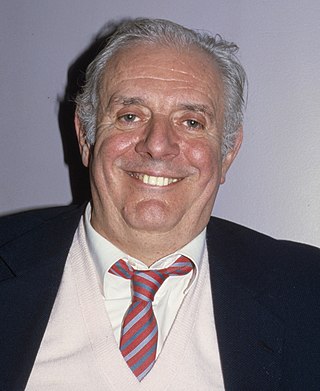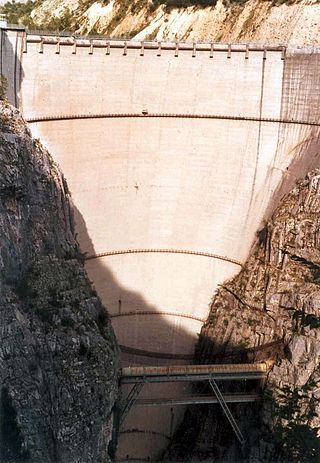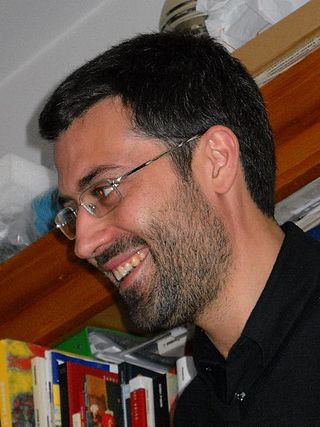Related Research Articles

Dario Luigi Angelo Fo was an Italian playwright, actor, theatre director, stage designer, songwriter, political campaigner for the Italian left wing and the recipient of the 1997 Nobel Prize in Literature. In his time he was "arguably the most widely performed contemporary playwright in world theatre". Much of his dramatic work depends on improvisation and comprises the recovery of "illegitimate" forms of theatre, such as those performed by giullari and, more famously, the ancient Italian style of commedia dell'arte.

Francesco Guccini is an Italian singer, songwriter, actor, and writer. During the five decades of his music career he has recorded 16 studio albums and collections, and 6 live albums. He is also a writer, having published autobiographic and noir novels, and a comics writer. Guccini also worked as actor, soundtrack composer, lexicographer and dialectologist.

The Vajont Dam or Vaiont Dam is a disused hydro-electric dam in northern Italy. It is one of the tallest dams in the world, with a height of 262 m (860 ft). It is in the valley of the Vajont (river) under Monte Toc, in the municipality of Erto e Casso, 100 km (62 mi) north of Venice.

Giovanni Carmelo Verga di Fontanabianca was an Italian realist (verista) writer, best known for his depictions of life in his native Sicily, especially the short story and later play Cavalleria rusticana and the novel I Malavoglia.
Johan Padan and the Discovery of the Americas is a one-man play by Dario Fo, recipient of the 1997 Nobel Prize in Literature. It is narrated by Johan Padan, a fugitive from the Spanish Inquisition who accompanies Christopher Columbus on his fourth voyage to the New World.

Marco Paolini is an Italian stage actor, theatre director, dramaturge and author.

Andrea Bajani is an Italian novelist, poet, and journalist. After his debut with Cordiali saluti, it was Se consideri le colpe which brought him a great deal of attention. Antonio Tabucchi wrote about his debut novel, "I read this book with an excitement that Italian literature hasn't made me feel in ages." The book won the Super Mondello Prize, the Brancati Prize, the Recanati Prize and the Lo Straniero Prize.

Bandabardò is an Italian folk rock band, it was formed in 1993.
Marco Betta is an Italian composer.
The Italian publishing house Editoria & Spettacolo di Maximilian La Monica I.i. was established in 2001 in Rome. Under the initiative of Maximilian La Monica, they specialize in the publication of theater and spectacle editions.
Mario Pirovano is an Italian theatre actor, translator and interpreter of Dario Fo monologues.
The Le Maschere del Teatro Italiano, more commonly known informally as the Le Maschere Award in Italian Le Maschere, recognizes achievement in live Italian theatre is the national theatre award of Italy. The awards are presented and decided by the Ente Teatrale Italiano (ETI) and supported by the Italian Ministry of Culture at an annual ceremony in Naples. The awards are given for Italian productions and performances.
The David di Donatello for Best Short Film is a category in the David di Donatello Awards, described as "Italy’s answer to the Oscars", presented annually by the Accademia del Cinema Italiano to recognize the most outstanding Italian short film released in Italy during the year preceding the ceremony, starting with the 1997 edition.

Remo Anzovino is an Italian composer, musician and criminal lawyer.

Ascanio Celestini is an Italian actor, director, writer and playwright.

Marco Filibeck is an Italian lighting designer.
This is a list of Italian television related events from 1997.

The theatre of Italy originates from the Middle Ages, with its background dating back to the times of the ancient Greek colonies of Magna Graecia, in Southern Italy, the theatre of the Italic peoples and the theatre of ancient Rome. It can therefore be assumed that there were two main lines of which the ancient Italian theatre developed in the Middle Ages. The first, consisting of the dramatization of Catholic liturgies and of which more documentation is retained, and the second, formed by pagan forms of spectacle such as the staging for city festivals, the court preparations of the jesters and the songs of the troubadours.

Roberto De Simone is an Italian stage director, playwright, composer and ethnomusicologist.
The Targa Tenco is a prize awarded annually by the Club Tenco. Founded in 1984, it has a large jury of 200 journalists and critics awarding the best works of the year. It is considered the most prestigious award in Italian music.
References
- Gerardo Guccini - Michela Marelli (eds), Stabat Mater, Bologna, Le Ariette, 2004;
- Gerardo Guccini (ed.), La bottega dei narratori, Roma, Dino Audino, 2005, ;
- P. Puppa, La voce solitaria, Bulzoni, 2010
- Simone Soriani (ed.), Cicoria. Del teatro di Ascanio Celestini e di Gaetano Ventriglia, Corazzano (PI), Titivillus, 2006;
- Simone Soriani, Sulla scena del racconto. A colloquio con Marco Baliani, Laura Curino, Marco Paolini, Ascanio Celestini, Davide Enia, Mario Perrotta, Civitella in Val di Chiana (AR), Zona, 2009; ID., Engagement, comunicazione e consolazione nel teatro dei narratori, in «Zibaldone», IX, 1-2, 2021, in https://ojs.uv.es/index.php/zibaldone/article/view/20680/pdf